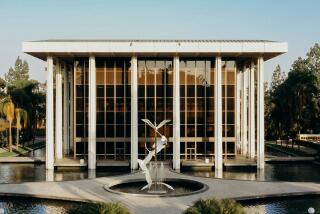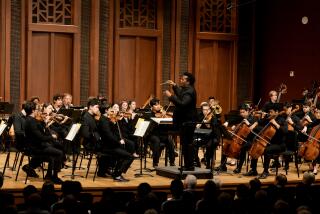MUSIC REVIEW : Parkening Showcases Skills at Ambassador
- Share via
Guitarist Christopher Parkening delighted a large, highly enthusiastic audience at Ambassador Auditorium on Thursday night with a program consisting almost entirely of the kind of musically unchallenging chestnuts that keep many public radio stations’ ratings up. But, with the occasional help of colleague David Brandon, Parkening practiced his small, exquisite artistry with such charismatic skill that it was clear why he has become a superstar.
On an evening when arrangements abounded, Parkening spent the first half on antique dances by Praetorius and Anon (assisted by Brandon), and sets of Dowland and Bach (the latter in arrangements by Segovia). At first, the modern harmonic fleshings-out seemed decidedly incongruous, but in Parkening’s hands they soon began to sound informed even though his basic elegance and clarity was occasionally disturbed by the demands of virtuosity.
The Bach pieces, the opening preludes of the Well-Tempered Clavier and the Cello Suite No. 1, and “Jesu, Joy of Man’s Desiring,” were the first half’s highlights, the music’s natural flow allowing Parkening a perfect framework within which his command of subtle nuance and color could work to maximum effect.
In the Handel Variations, Opus 107, by Mauro Giuliani, however, which ended the first half, Parkening seemed disconcerted by the faster notes and failed to give the urbane music its due.
The music on the second half was more congenial to the guitarist, beginning with an exceptionally seductive “Villanesca” by Granados, and continuing with Alexandre Tansman’s “Suite in Modo Polonico” and the familiar beauties of music by Villa-Lobos and Albeniz.
After Brandon joined him again for a concluding set--including Andrew York’s recent “Evening Dance” and one of Castelnuovo-Tedesco’s 24 Preludes and Fugues, both works of extraordinary, candle-lit radiance--Parkening responded to a spontaneous standing ovation with encores by Falla (with Brandon) and Gaspar Sanz, and Segovia’s coy arrangement of a Catalan lullaby.
More to Read
The biggest entertainment stories
Get our big stories about Hollywood, film, television, music, arts, culture and more right in your inbox as soon as they publish.
You may occasionally receive promotional content from the Los Angeles Times.









